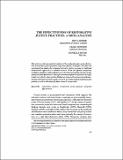| dc.description.abstract |
This article provides an empirical synthesis of the existing literature on the effectiveness of restorative justice practices using meta-analytic techniques. The data were aggregated from studies that compared restorative justice programs to traditional nonrestorative approaches to criminal behavior. Victim and offender satisfaction, restitution compliance, and recidivism were selected as appropriate outcomes to adequately measure effectiveness. Although restorative programs were found to be significantly more effective, these positive findings are tempered by an important self-selection bias inherent in restorative justice research. A possible method of addressing this problem, as well as directions for future research, are provided. |

